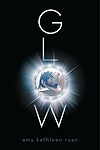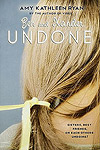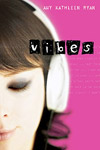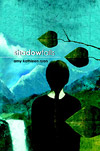
Came across this piece I wrote in graduate school in New York. Thought you might enjoy it.
Blind
“Look at that man.” Bertram pointed across the subway car.
Fat in mismatched clothes, the man twirled a plastic tube of Avon lotion like a wand. He said in a Queens squeak, “Hand creams. High quality. Ten dollars.” His expression changed from grimace to smile to frown as he rocked back and forth.
“He looks crazy,” Helena agreed. The man was wearing brown pants and a hot pink tee shirt, much too small for him. She remembered the design from the seventies, but time had been unkind to it. Farrah Faucet, her face cracked, her hair streaked like alien’s tentacles, smiled maniacally, her torso painfully warped by the man’s enormous paunch. Helena shuddered, and smoothed the green wool of her pleated skirt, amazed by what some people thought looked good on them.
Bertram, handsome in brown leather, said, “I would never let myself go like that.”
She nodded, patted his firm arm.
She thought of the poached salmon with tarragon she was planning for that evening. She would light the candles while Bertram put Bach on the stereo, and they would sit across from each other over their Venetian tablecloth. Bertram would say how her cooking reminded him of home. She never told him, but Bertram’s mother had scrawled recipes on cards with gold foil edges and sent them tied in a blue silk ribbon. Helena had ironed the ribbon flat again, and sent it wrapped around an anniversary gift to her parents, who still used paper bows. It was useless. They were paper bow people and there was no changing them.
The crazy man dropped the plastic tube into his Sax Fifth shopping bag and picked up another, identical to the last. She wondered how he got that bag, if he sifted through garbage at Midtown apartment buildings, or if rich women brought donations to his shelter.
The train shrieked into the next station. Helena watched colors and patterns scrambling for a seat. Fluorescent light flickered over blank features - subway faces - she mused, careful not to be caught looking, embarrassed by chance eye contact. She snuck a look at Bertram’s patrician profile. She had gotten everything she had wanted when she came to New York. It was the perfect city for her, for them, the perfect setting for the life she wanted.
A pretty brunette passed him by, gave him a smile with knowing brown eyes.
“I got tickets to As You Like It,” Helena said. She had planned to tell him that evening over dinner, but she wanted to please him now.
His eyes skirted over her as he fidgeted with a cufflink. “Shaw, right?”
She let it pass. He hated to be corrected. “It’s been sold out for months.”
“How did you manage that?”
“I spotted them in the classifieds,” she said proudly.
He said, “Not his best play, but I hear its a good production.”
Of course. She should have waited for Pygmalion.
She teased the Times from under his arm and glanced over the headlines. Recalling how annoyed he had been with their flight to Aspen, she said brightly, “They’re doing construction at JFK.”
“What a waste.”
“Delays at JFK affect the entire country.”
“Delays anywhere affect the entire country.”
Suddenly the fat man leaned into the aisle, shouting, “Mingled yarn! Mingled yarn, what is it?” He pushed his lips out, tapping his temple.
Helena’s eyes widened. “He’s making me a little nervous.”
“Just ignore him.”
She directed her gaze elsewhere, and noticed an elderly Asian woman hugging a shopping bag full of cushions. The woman’s eyes were two dark slits, and Helena realized how exposed her own gaze was in comparison.
The door at the end of the subway car opened. A South American man had come to sell cheap plastic toys. He walked slowly down the middle of the car, tugging at the pull string on a plastic fish as he murmured, “Fun toy. One dollar. Fun to play.” No one looked at him.
Bertram whispered, “Have you ever seen anyone buy that junk?”
She grinned, shaking her head, even though she had seen stout women buy them for grandchildren.
Suddenly the fat man sat up straight in his seat, clapping, saying loudly. ““The web of our life is of a mingled yarn!””
“What the hell is with that guy?” Bertram was annoyed now.
“Look at his eyes.” Helena said. Atrophied globes jiggled in their sockets.
“Yeah, so?”
The man clapped again, nodding, and called out, “Mingled yarn. You know what that’s from??
Bertram whispered, “Sheep?”
She giggled a little, but felt embarrassed. She couldn’t begin to guess why.
The train crushed into the next station. She pressed on the lily-skin just beneath her right ear to deaden the shrill of metal wheels on metal tracks. The Asian woman got off, and the car filled with dozens of high school kids on their way home for the day. Suddenly the air was electric and alive.
“Great,” said Bertram.
Several tall, black boys started a game of craps at the end of the car, taking bets from other youth who crowded around to watch. Helena noticed one slender black girl sitting on the edge of the game facing away from the havoc. She wore a blue plaid uniform. Her ankles were crossed, posture rod-like, hair pulled neatly into a twist at the back of her head. The tallest boy spread his fingers over her thighs as he leaned to whisper in her ear. Her large brown eyes darted over the car as she nodded and pulled out a small change purse. From it she pried a five dollar bill and handed it to the youth without looking at him. Fool, thought Helena. The girl’s eyes shifted toward her own, so she casually looked just past her, out the window at the soggy cement walls of the tunnel whirring by.
The fat blind man rocked, called hopefully into the chaos, “Lotions. Beautiful smell.” He twirled a tube between his thumb and forefinger, but the train lurched, and the lotion bounced out of his hands and slid across the floor of the car.
It landed near Bertram”s brown leather oxford.
“Can I have my lotion back,” asked the fat man.
Bertram kicked it, but it slid past the man to hit the metal door at the far end of the car.
The man asked, “Is it by the door?”
Helena didn’t think anyone heard.
“No one’s going to help me out, here?”
Helena looked around. People were reading the paper, or sitting with their eyes closed, or looking at some secret point right ahead of them.
The blind man sat completely still for a moment, listening. Then, with a sigh, he lowered himself painfully onto his knees and crawled to the end of the car. He was so fat that his belly scraped along the grime of the floor, dirtying Farrah Faucet’s cleavage. His hand swept over sticky debris, back and forth. Once he called out, “Hot or cold? Hot or cold?”
“Cold,” she wanted to tell him. “To your right, in the other corner,” she wanted to say.
The craps game had slowed down. The tallest youth watched the fat man’s progress as he shook the dice.
Helena squeezed Bertram’s arm, turning her aqua eyes to look at his face.
He sighed, but got up from his seat and walked to the end of the car. He stood over the man, arms crossed, watching his progress until the fat man said, “Are you going to help or what?” Bertram picked up the tube of lotion and touched the man’s shoulder with it. The man closed ponderous fingers around the tube, saying quietly, “All’s Well that Ends Well. What I was saying before? Mingled yarn? It’s from that.”
Bertram nodded at the man and strolled back to his seat. Helena was proud of her kind husband, but from the corner of her eye watched as the fat man tried to get up. He rolled his mass backward, then forward, straining against the floor, but couldn’t seem to get his feet under himself. Finally he rolled onto his belly again and crawled to his seat.
She felt relieved until she noticed a woman with shadowed eyes and no wedding band staring at Bertram from across the aisle. Helena didn’t like the way she was looking at him. Maybe she was jealous because she was old and ugly and unmarried. But her expression was mean spirited. Helena stared at her until the woman turned back to her magazine. Nasty old witch.
“Is anyone getting off at 42nd street?” It was the fat man again, whining into the chaos of the car. Helena glanced around. Everyone still had on their subway faces. A woman dressed in a green sari, half asleep, opened her eyes in the fat man’s direction, and closed them again.
“I said is anyone getting off at 42nd street?” He called again, loudly.
Helena was glad she was going all the way to 86th. She leaned her head on her husband’s shoulder, thinking she could sit like this all day.
The fat man shook his head, his lips working a rhythm until he cried, “Is no one getting off at 42nd?”She watched him as he pulled his tee shirt roughly over his belly, shaking his head, waiting in the impassive silence. The train lurched as it started to slow down, and he wriggled with anxiety. “What about you theater lovers? You getting off, maybe?” She looked at Bertram, who glanced at her from the corner of his eye and shook his head very slightly. She held her breath. Maybe the man would think they had left already. The fat man pleaded, “I just need help to the stairs. I won’t touch yous.”
The slender black girl stood. The tall boy, who lost all her money in the game, asked, “What are you doing?”
She ignored her boyfriend and wove down the length of the car toward the man. She murmured something to him, and he nodded as he pulled a filthy bandanna from his hip pocket and wiped his face. He said, “OK, Sweetheart.”
Helena heard the whine of wheels against an inevitable ton of metal.
Bracing her stringy legs, the elegant black girl picked up the shopping bag full of lotions while the fat man struggled to his feet.
The train stopped altogether.
The girl offered the stranger her elbow, and they waited, side by side, until the doors opened.
Bertram, chortling, shook his head. “Pathetic.”
“Wanna' talk pathetic,” the fat man said over his shoulder, “Shakespeare wrote As You Like It. Moron.” Then, side by side, the tall skinny girl and the fat blind man walked into the artificial light of the station.


















